The human brain is endlessly fascinating. This organ never rests, continuously making connections and assumptions about the world surrounding us and the things in it. The brain creates patterns from the tiniest bits of informational inputs, thereby forming thoughts, statements, arguments, and ideas. It allows us to build up our own interpretations of situations, datasets, and people. Trying to sort through all of this information in a sensible, logical way is referred to as reasoning.
We utilize this process every single day in educational, work, and domestic environments. Some of our reasonings are inductive, while others can be deductive. Understanding the difference between them will improve your critical thinking and communication skills.
Our team has prepared an article to explain both the deductive and inductive reasoning processes. We’ll cover their respective structures, strengths, weaknesses, and real-life uses. After reading this piece, you’ll clearly understand both types and gain the knowledge and skills to objectively assess facts and build compelling arguments.
🕵️♀️ What Is a Deductive Argument?
If you are familiar with Sherlock Holmes, you will have a basic idea of the deductive framework. Deductive reasoning allows you to make conclusions from several general premises. For it to work, these statements have to be accurate, and there should be a clear connection between a proposition and a conclusion.
This method utilizes the fundamental law of reasoning and allows the creation of new information and facts from available data. In deductive reasoning, premises have to be generally accepted facts and ideas. For example, the boiling temperature of the water is 100 degrees Celsius. The water in the pot is boiling. Therefore, the water temperature is 100 degrees.
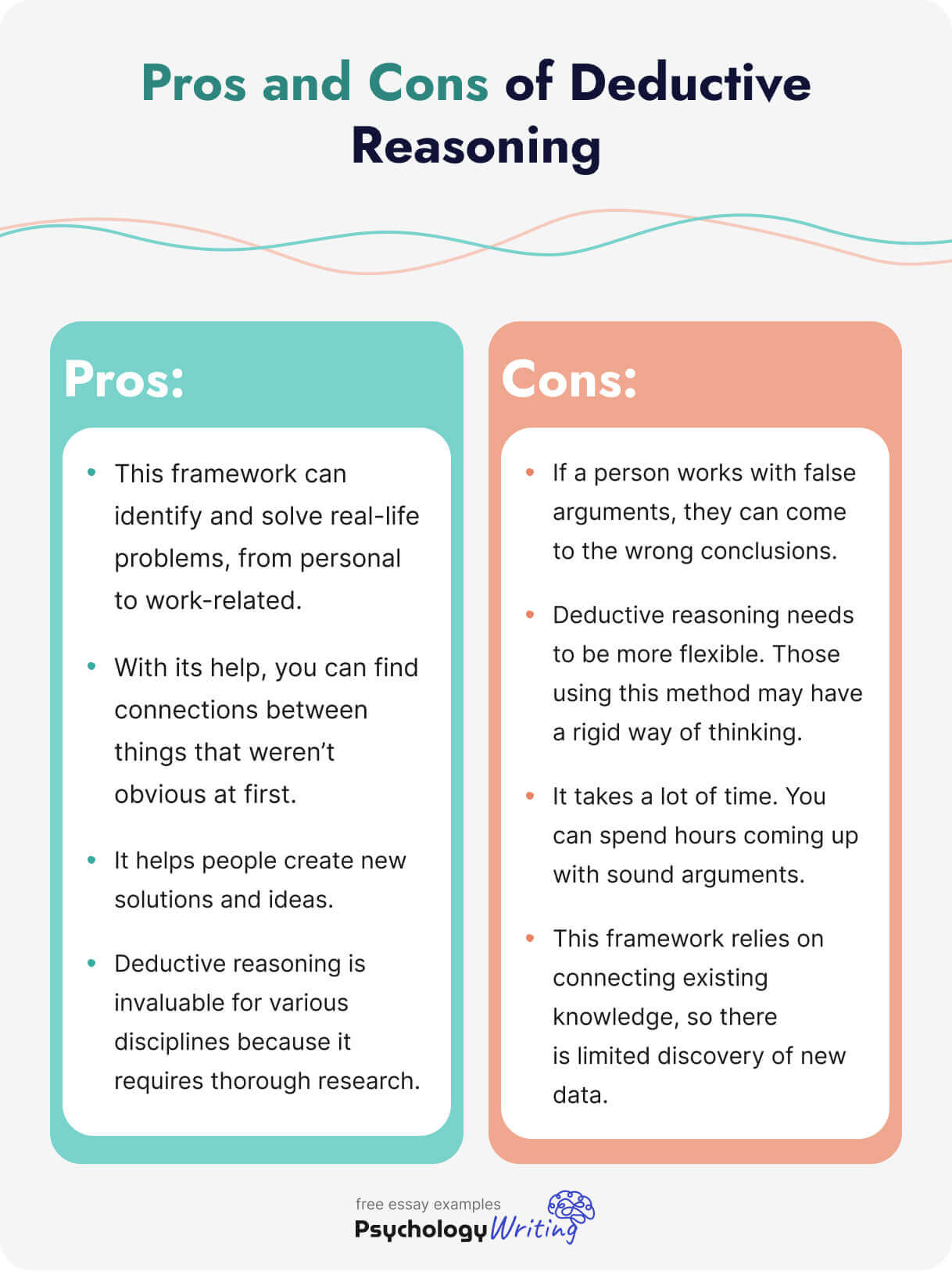
When to Use Deductive Arguments?
Deductive arguments are a powerful tool. However, it is important to remember that there is a time and place for using them. Incorrect application of the deductive method can lead to wrong conclusions. There are several instances where this method is most effective:
- In research.
We most often apply the deductive reasoning process when conducting any scientific research. In particular, it is frequently applied to quantitative methods. When researchers test their hypotheses to determine whether their predictions will come true, they use deduction. In fact, this is referred to as the hypothetico-deductive model. - While doing business.
Business owners can use the deductive method for several reasons. This may involve finding out the reasons for customer dissatisfaction or making a new online store layout to attract visitors. The deductive framework can also be helpful in solving work-related issues, as HR departments may use deductive reasoning to make logical decisions. This relates to everything from recruiting people to managing staff members. The reasoned approach leads to better team cohesion. - During police work.
Deduction isn’t just used by fictional detectives like Sherlock Holmes – real-life police officers also rely on it. When investigators and forensic scientists arrive at the scene of the crime, they will often utilize this method. That means they will begin with a theory, formulate a hypothesis about the course of events, and then look for clues to confirm it.
Deductive Reasoning Process
Understanding deductive reasoning improves your logical thinking. This makes tackling obstacles in education, work, and even everyday life easier. That’s why we’ve dedicated this segment to explaining the process of deductive reasoning.
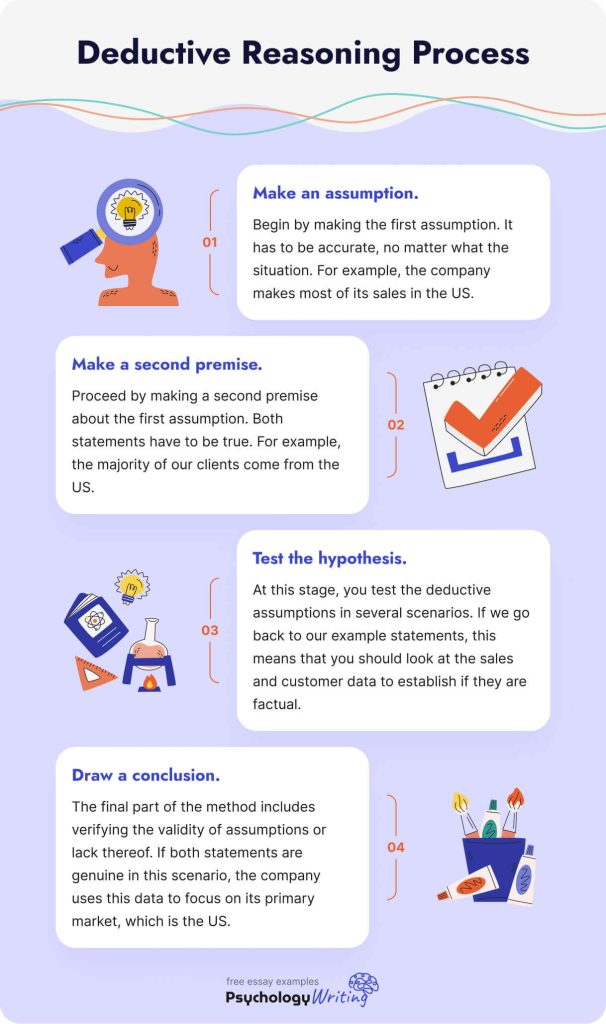
🔎 Types of Deductive Arguments
Deductive arguments are fundamental to logical and critical thinking. There are three types of reasoning reserved for different situations. They are different both in form and structure. Understanding the different kinds of deductive arguments will help you evaluate the strength and validity of the arguments you come across.
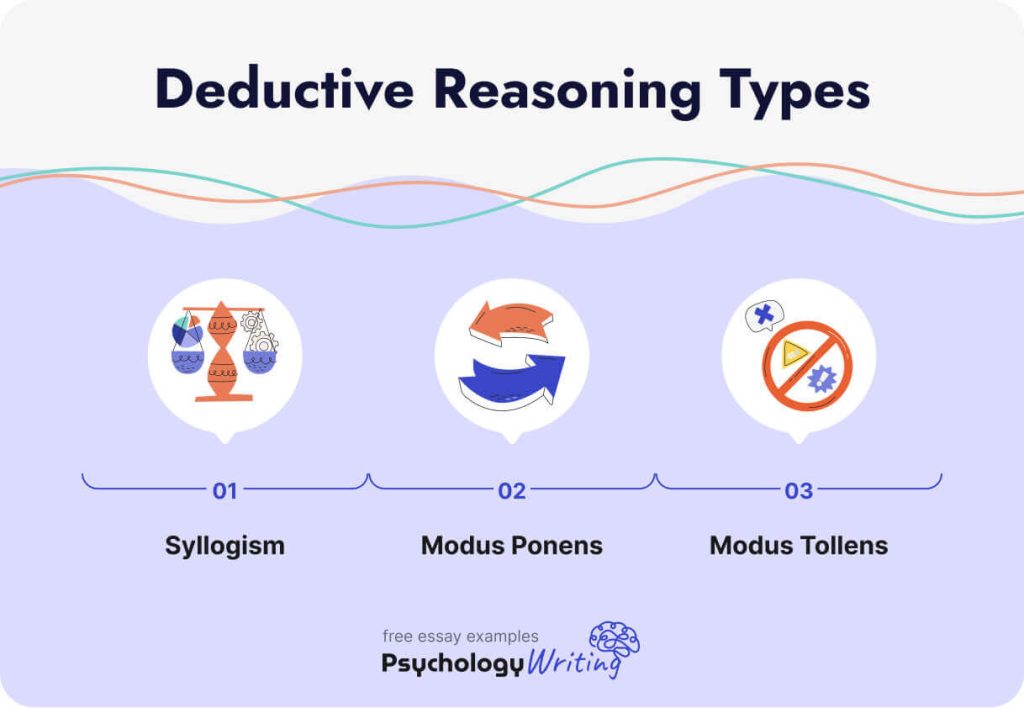
These include statements found in the academic environment, professional papers, and day-to-day life. Take a closer look at these three deductive reasoning structures:
- Syllogism
This type of deduction uses the first statement’s hypothesis and the second statement’s conclusion. The formula looks like this: if A=B and C=A, then C=B. It’s the simplest deduction method. - Modus Ponens
Modus ponens works as a cascade, where the following notion confirms the previous one. In this deductive approach, only the first statement is conditional. The second premise reinforces the previous one. - Modus Tollens
This deductive reasoning type is also known as the law of contrapositive. In this approach, the second premise negates the last half of the previous conditional statement.
Deductive Reasoning Examples
Deductive reasoning can be hard to understand in theory. This is why we have come up with several examples that you can use to help improve your understanding. Below, we cover real life examples of syllogisms, modus ponens, and modus tollens.
- Syllogism
- Example 1: Stan needs to drive his car to the store. Stan has no gasoline. Therefore, Stan can’t drive to the store.
- Example 2: People can’t hunt endangered species. Tigers are endangered. Therefore, tigers can’t be hunted.
- Modus Ponens
- Example 1: The website gets more visitors after 20:00. It’s now 21:00. Therefore, more customers are on the page now.
- Example 2: Millennials were born between 1981 and 1996. Kevin was born in 1990. Therefore, Kevin is a millennial.
- Modus Tollens
- Example 1: The bills arrive on Mondays. There were no bills today. Therefore, today is not Monday.
- Example 2: Cars have four wheels. This vehicle doesn’t have four wheels. Therefore, it’s not a car.
🕵️♂️ What Is an Inductive Argument?
Inductive reasoning is the process of logical analysis of specific cases or situations. Such research aims to determine general principles that prove the validity of the conclusions. In such way, it’s possible to predict the influence of various factors. It’s also called the bottom-up method, as the study moves from the result to the causes.
Despite the logic of this approach, it is important to note that the same factors can lead to different results. Also, only some identical results may have been influenced by the same reasons or aspects. For example, every time you eat pizza, it tastes good. Therefore, you conclude that the next time you eat pizza, it’ll taste good too. However, if you think about it, you might end up with a pizza with spoiled products or burnt dough. In this situation, the inductive findings lose their validity.
The more influencing factors you add, the more accurate the probability of getting the desired result. You can choose a particular pizzeria, the type of pizza, and the chef who makes it. The possibility of the expected result depends directly on the number of observations and the quality of your evidence.
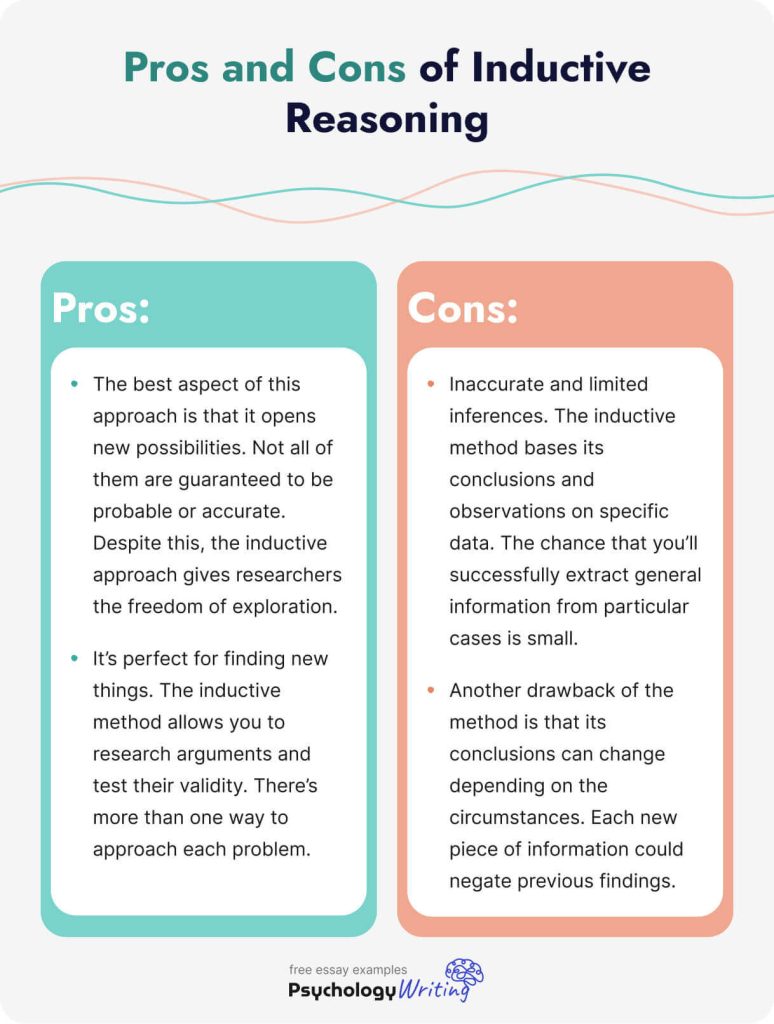
When to Use Inductive Arguments?
Inductive reasoning is a valuable tool for making generalizations and predictions based on specific sightings and data. Let’s look at situations where inductive reasoning is most effective.
In scientific research.
Inductive reasoning is helpful in scientific research, especially when there aren’t enough facts to develop a general theory. It’s also beneficial when the argument lacks observation, and there is no way to experiment to gather additional insights.
During decision-making.
This type of reasoning can be used when making decisions, weighing the pros and cons of different options, and considering the probability of different outcomes. Inductive reasoning can also be a powerful tool for persuasive communication because it allows you to present evidence and opinions to support your position.
While making predictions.
Inductive arguments are used to make predictions and create hypotheses or theories predicated on observations and accessible information. For example, it is possible to use historical data to predict an economic downturn or rise, the demand for specific technologies, demographic changes, etc.
In problem-solving.
Inductive reasoning can help identify patterns and connections between different pieces of information, which can be useful for solving complex problems.
However, it’s also valuable to remember that such arguments aren’t infallible and can lead to incorrect conclusions. Thus, it’s crucial to use them along with other forms of reasoning, such as deductive reasoning, and to keep the limitations of inductive arguments in mind.
Inductive Reasoning Process
Inductive reasoning allows us to remain inquisitive and keep uncovering the secrets of the world. This framework allows scientific research to flourish, allowing us to ask important questions. In this section, we’ll break down the process of inductive reasoning step-by-step:
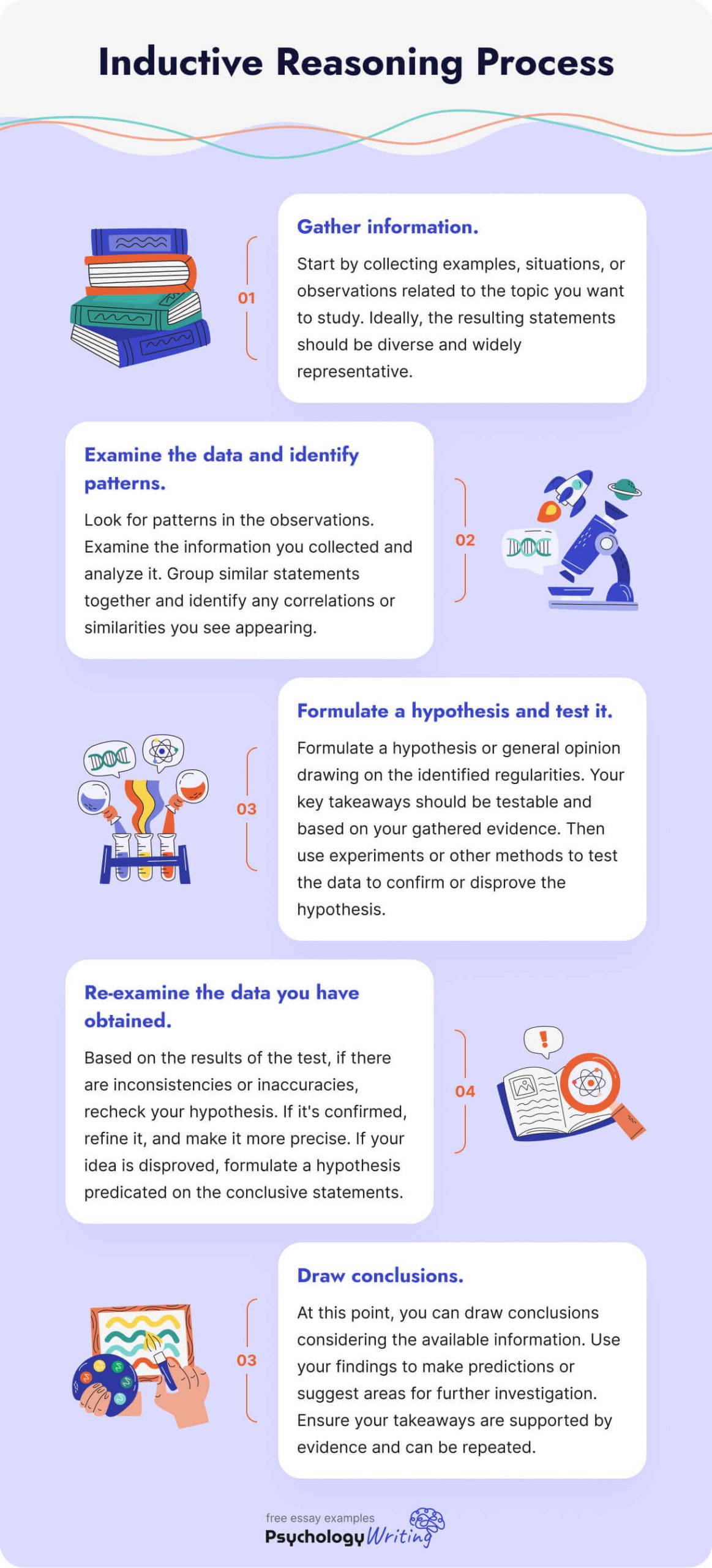
🧐 Types of Inductive Arguments
Inductive reasoning is a process that draws general findings from specific observations or evidence. However, not all inductive arguments are the same. Depending on the situation, there are different approaches and methods. Understanding the different types is essential for objectively assessing the validity and reliability of conclusions.
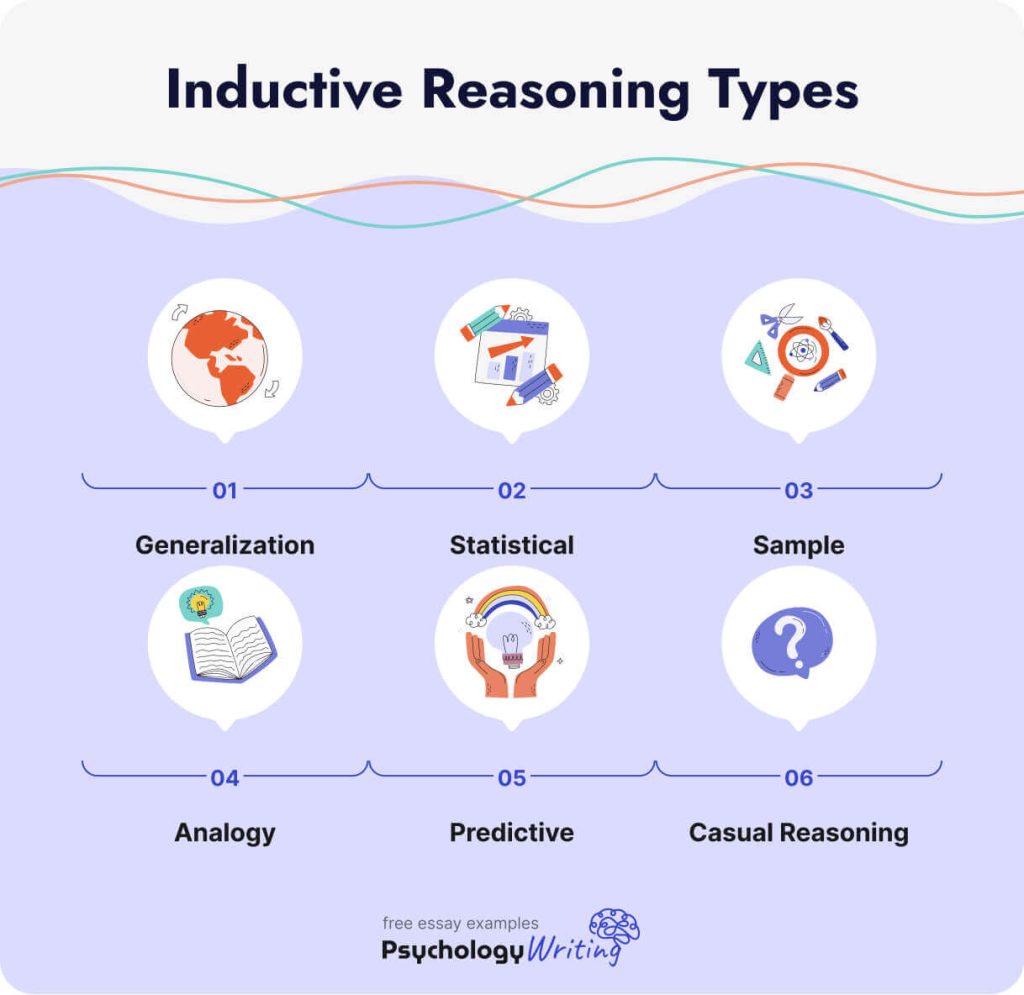
By learning the characteristics and application of each, you’ll be better able to guide yourself through the various and complex systems of inductive reasoning. You can read about the most common ones here:
- Generalization
This type draws generalized statements predicated on definite facts. As a rule, it uses data from random and large samples. It also uses counterexamples to support the conclusion. - Statistical
To analyze a situation in this way, we need statistics. The argument uses statistical data. It’s crucial to remain open to including additional or updated data that may significantly affect your conclusions. - Sample
This type helps you analyze and draw conclusions from other examples. You find similar examples of your situation and make findings based on another sample’s characteristics, factors, and key takeaways. - Analogy
You need to find an analogy to apply to your theory. Afterward, you choose detailed information or arguments from another field that correlate to yours. Once you have selected similar properties and similarities, you can conclude. - Predictive
In this type, you’ll form your conclusion based on predictions. The main idea is to use your forecasts from life experience and real examples. By accepting certain assumptions, you’ll integrate them to support the theory. - Casual Reasoning
This assumes that your arguments will be based on cause-and-effect and logical inferences. They should connect the situation you’re analyzing, the evidence, and the statements. However, the reasoning method will only be effective if you include all elements of this analysis.
Inductive Reasoning Examples
Here is a list of inductive argument examples:
- Generalization
- Example 1: The restaurant has consistently received excellent marks in customer satisfaction surveys over the past five years. Consequently, customers will rate the restaurant highly in the future.
- Example 2: The car manufacturer has seen a decrease in the number of warranty claims over the past three years. Based on this trend, we can assume that the manufacturer will continue to produce reliable cars with fewer defects.
- Statistical
- Example 1: 96% of the marketing department employees met their plan for the month. Megan is an employee in that department, so there is a reasonable probability that she has met her work plan for the month.
- Example 2: In 50% of cases, students receive an A grade for the final test, 30% get a B, and 20% get a C grade. So statistically, all students pass the test.
- Sample
- Example 1: All the employees wear business attire because it’s critical to the company’s culture. This suggests that professional clothing also influences similar companies.
- Example 2: All students in your department get extra assignments for self-development. Students from other departments at your university likely receive additional tasks as well.
- Analogy
- Example 1: HR staff members receive the highest salaries in the company. Hence, in the corporation, the wages of the HR department cannot be lower than others in the company.
- Example 2: All computers have a central processor. MacBook is a computer. Consequently, the MacBook probably has a central processor.
- Predictive
- Example 1: I attended one conference last year, and all the speakers had higher education and many years of experience in IT. For this reason, when I visit the same conference next year, all the speakers will probably have similar qualifications and experience.
- Example 2: The last book I read was a bestseller and won several awards. Therefore, if I read a new book by the same author, this one will be equally well-written and engaging.
- Casual Reasoning
- Example 1: Previously, when your classmate worked on his assessments, he listened to classical music and got good grades. This time, he didn’t listen to music while he worked on his project and got a bad grade. Hence, music had a positive effect on his thought processes.
- Example 2: A professional athlete always wears his same favorite socks for a game and wins. However, he forgot to wear his lucky socks during the last match and was defeated. Thus, the presence of those socks may have an effect on his athletic skills.
📝 Main Differences between Deductive and Inductive Arguments
Understanding the differences between deductive and inductive arguments will improve your decision-making and critical thinking skills. To simplify things, we’ve made this comparison table:
💡 Combining Deductive and Inductive Reasoning
Combining deductive and inductive reasoning can lead to a deeper understanding of complex problems. Whether studying natural sciences, social sciences, or humanities, combining these arguments will improve your ability to think critically.
A combined approach is beneficial when dealing with large research projects. Generally, you begin with inductive reasoning, as this method helps select a relevant research topic and develop a stable theory or hypothesis. After this, you should apply the deductive approach to refute or confirm conclusions. This way, you can effectively structure your paper and reduce the likelihood of mistakes, flaws, and preconceived notions.
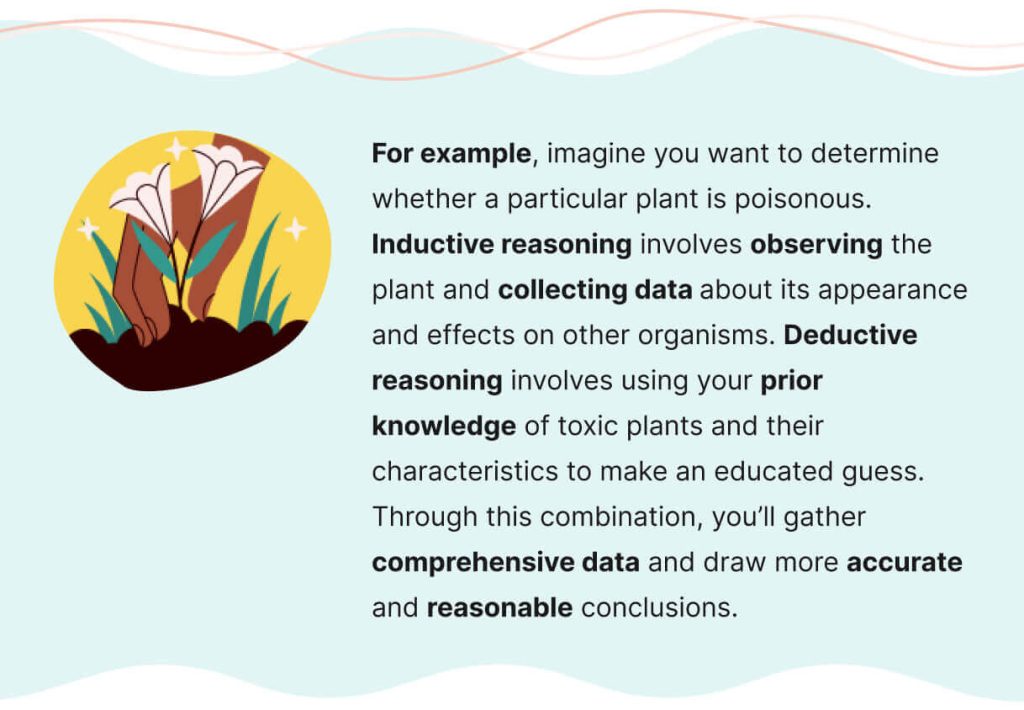
To summarize, both deductive and inductive reasoning have their strengths and weaknesses. While deductive reasoning is practical when you require absolute certainty, inductive reasoning is better suited to predictions and generalizations. We hope our article helps you become more effective critical thinkers and communicators. If you have friends also interested in this topic, send them this link!
📎 References
- Inductive Logic. – James Hawthorne, Stanford Encyclopedia of Philosophy
- The Meaning of Induction and Deduction, with Argument Examples. – Abbey Rennemeyer, freeCodeCamp
- Inductive Reasoning and Inductive Arguments. – University of Hawaii
- Inductive vs. Deductive Reasoning. – Hanne Keiling, Indeed
- What’s the Difference between Deductive Reasoning and Inductive Reasoning? – Alina Bradford, Nicoletta Lanese, and Mindy Weisberger, LiveScience

